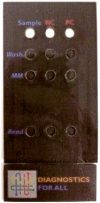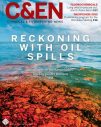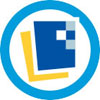ACS News Service Weekly PressPac: July 15, 2015
ACS News Service Weekly PressPac: July 15, 2015
- General Inquiries: Michael Bernstein, 202-872-6042
- Science Inquiries: Katie Cottingham, Ph.D., 301-775-8455
News Items in This Edition
Attention beachgoers: Fecal contamination affects sand more than water
“No swimming” signs have already popped up this summer along coastlines where fecal bacteria have invaded otherwise inviting waters. Some vacationers ignore the signs while others resign themselves to tanning and playing on the beach. But should those avoiding the water be wary of the sand, too? New...

A portable ‘paper machine’ can diagnose disease for less than $2
In the U.S. and other industrialized nations, testing for infectious diseases and cancer often requires expensive equipment and highly trained specialists. In countries where resources are limited, performing the same diagnostics is far...

The secret to the sea sapphire’s colors — and invisibility (video)
Sapphirina, or sea sapphire, has been called “the most beautiful animal you’ve never seen,” and it could be one of the most magical. Some of the tiny, little-known copepods appear to flash in and out of brilliantly colored blue...

Implantable 'artificial pancreas' could help diabetes patients control their blood sugar
Living with Type 1 diabetes requires constant monitoring of blood sugar levels and injecting insulin daily. Now scientists are reporting in the ACS journal Industrial & Engineering Chemistry Research the development of an implantable...

Lessons learned from the Exxon Valdez and Deepwater Horizon oil spills
Five years ago this week, engineers stopped the Deepwater Horizon (DWH) oil spill — the largest one in U.S. history, easily displacing the Exxon Valdez spill from the top spot. Now, Chemical & Engineering News (C&EN), the weekly...

Journalists’ Resources
ACS Experts: Chemistry Sources for Reporters
On a deadline? Need a reliable explanation of a chemistry concept? Then you need an ACS Expert. We have a growing list of scientists who can comment about neuroscience, green chemistry, pharmaceutical science, policy issues and much more. Just contact us at newsroom@acs.org.
ACS Editors' Choice
Do you want to keep up with the frontiers of science? Check out our new Open Access service, ACS Editors’ Choice. The website features one top story every day, selected from ACS’ more than 40 peer-reviewed journals, to give the public free, direct access to some of the most relevant scientific research going on today.

ACS National Meeting News
Couldn't go to the ACS 249th National Meeting & Exposition in Denver? Then check out our resources for info you might have missed:
Press releases: www.eurekalert.org/acsmeet.php
Press conferences: www.ustream.tv/channel/acslive
ACS Webinars®
The Creator’s Code: The Six Essential Skills of Extraordinary Entrepreneurs
Thursday, July 23, 2 - 3 p.m. ET
How do some people turn ideas into enterprises that endure, and why do some succeed at scaling new initiatives when so many others fail? Join Amy Wilkinson, a strategic adviser, entrepreneur and lecturer at the Stanford Graduate School of Business, in this ACS Webinar that unlocks the six essential skills that turn small notions into big breakthroughs.
Toolkits on Global Challenges/Research Funding
Journalists covering some of the great global challenges of the 21st century and federal funding of research and development (R&D) can find videos and scores of other resources in websites that the American Chemical Society has prepared on those topics.
ACS Press Release Archive
Visit our press release archive for news on a variety of chemistry-related topics.
ACS Videos
The American Chemical Society encourages news organizations, museums, educational organizations and other websites to embed links to these videos.
ACS Video of the Month
Connecting that Salty Sea Smell and Climate Change
There’s nothing like the smell of salty sea air over summer vacation. But instead of frolicking on the beach, a group of chemists is researching the compounds inside that air. Sea spray aerosols (SSAs) are created with every breaking wave. Kimberly Prather, Ph.D., Timothy Bertram and their teams have discovered in research published in ACS Central Science that SSAs have a huge impact on the planet’s climate. Watch this video for Prather's explanation.
Check out more Reactions videos and subscribe to the series at http://youtube.com/ACSReactions and follow Reactions on Twitter @ACSReactions.
C&EN Video Spotlight
Keeping Cool without Killing the Planet
Refrigeration is a staple of modern living—we use refrigerants in air conditioners, aerosol spray cans, and, well, refrigerators. But it turns out that the most popular refrigerants of the 20th century depleted the ozone and had high global warming potentials. In this Speaking of Chemistry episode, Sophia Cai takes a look at the pros and cons of recently approved alternatives.
Related Links
ACS Podcasts
Science Elements
Science Elements is a podcast that makes cutting-edge scientific discoveries from ACS journals available to a broader public audience. Listen to the podcasts at www.acs.org/ScienceElements.

This is the latest American Chemical Society (ACS) Office of Public Affairs Weekly PressPac with news from ACS’ more than 40 peer-reviewed journals and Chemical & Engineering News.
This information is intended for your personal use in news gathering and reporting and should not be distributed to others. Anyone using advance ACS Office of Public Affairs Weekly PressPac information for stocks or securities dealing may be guilty of insider trading under the federal Securities Exchange Act of 1934.
Please cite the individual journal, or the American Chemical Society, as the source of this information.
The American Chemical Society is a nonprofit organization chartered by the U.S. Congress. With more than 158,000 members, ACS is the world’s largest scientific society and a global leader in providing access to chemistry-related research through its multiple databases, peer-reviewed journals and scientific conferences. Its main offices are in Washington, D.C., and Columbus, Ohio.

